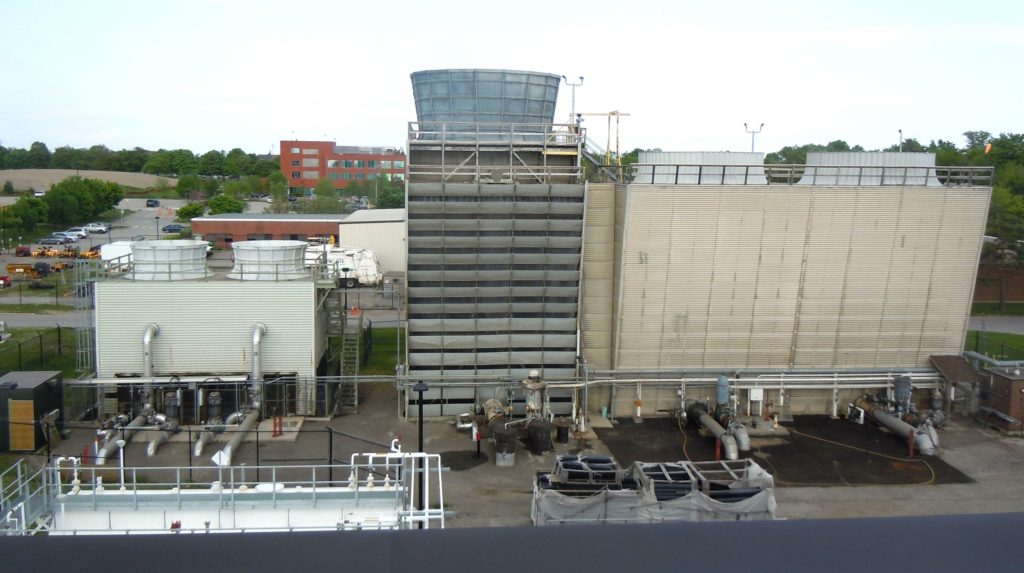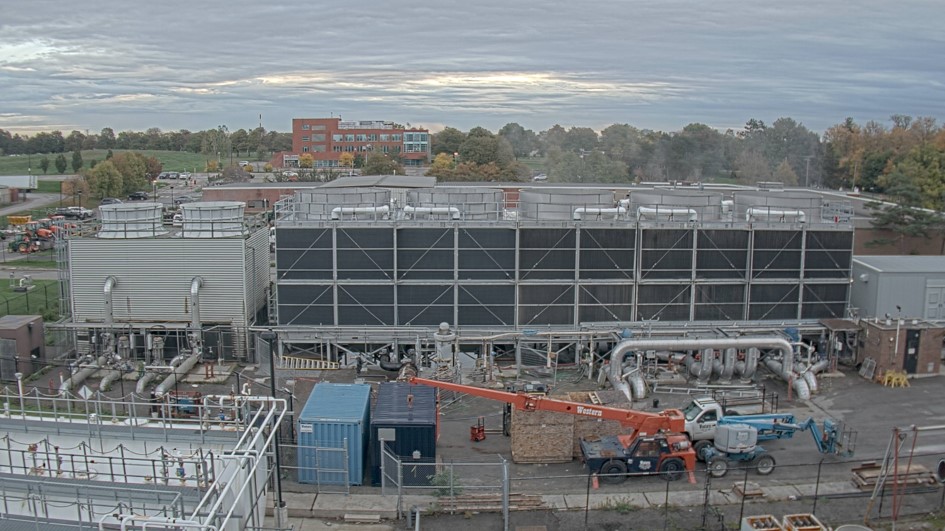York is a leading international teaching and research university and a driving force for positive change. Empowered by a welcoming and diverse community with a uniquely global perspective, we are building a future with exciting construction projects as we prepare our students for their long-term career and personal success. Together we are making things right for our communities, our planet, and our future.
For Construction Updates, click here.
Cooling Tower Replacement Project
The large Cooling Towers at the Central Utilities plant, located at the corner of Chimneystack and Severn Roads, are key pieces of equipment in the chilled water system that provides air conditioning to campus buildings. The original towers were installed in the 1960’s and 1970’s, with a brand new addition in 2004. Cooling Tower Number 3 reached it’s end of life and required replacement in 2021 – this closely followed the replacement of Cooling Towers Numbered 1 & 2 that received the same treatment in the spring of 2018. Design efforts centered on resiliency, energy efficiency, and increased capability in cooling capacity while maintaining the existing footprint.

Cooling Towers 1960-70s 
Cooling Towers 2021
The firm of MCW Consultants Ltd provided the design engineering, planned the demolition, and has provided construction administration. Demolition occurred in January 2021, and the modular components of the new cooling tower arrived by truck in August and September of 2021. The mechanical installation was completed in November 2021, and the electrical work will wrap up with final commissioning slated for April 2022.
Our Environmental Design Team works with Planning and Sustainability colleagues to plan and develop the University's infrastructure relative to the natural and human environment. This includes design and sustainability considerations for over 500 acres of green space and 96+ multi-use buildings used by approximately 60,000 students and employees. Explore the initiatives the Environmental Design Team has supported below.
Commemorative Tree Program
The York University Commemorative Tree Program offers members of the University community the opportunity to commemorate individuals or an event by dedicating a tree or trees at the Keele or Glendon campuses.
Typically, a young tree is planted as part of the ceremony of tree dedication. A donation is required to pay for a tree and have it installed. The choice of tree and where it is installed is determined in consultation with the Campus Planner. A plaque is used to identify the type of tree and the reason for its dedication. Aa record of the dedication is entered into the Book of Remembrance housed in the Honour Court.
Alternatively, an existing tree may be dedicated.
If you would like to dedicate a tree at York University, please contact Maria Rica Lapig, Donor Relations Coordinator, at 437-235-8130 or email at mlapig@yorku.ca.
Green Space
The Environmental Design Team ensures that infrastructure initiatives do not impact the natural and green spaces on our campuses.
- Curtis Green
- The Arboretum Grounds
- South Library Lane Lawn
- Stong Pond
- Founders Lawn
- Vanier Lawn
- The Harry W. Arthurs Common
- The Green
- Student Services Lawn
- Michael G. Boyer Woodlot
- Danby Woodlot
- Boynton Woodlot
- Saywell Woods
President's Sustainability Council
The Sustainability Team plays an active role on the President's Sustainability Council, and serves as the on-campus advocate for environmental sustainability at York University. Working with internal and external stakeholders, the team identifies opportunities and implements solutions, works to reduce risk and ensures environmental sustainability is embedded into capital projects, campus maintenance, operations and infrastructure improvements.
York University is committed to sustainability and has a strong history of sustainability within Facilities Services (FS). A wide variety of activities and initiatives are currently ongoing across FS and it has led to significant achievements in several key areas, including energy conservation, waste management, food and transportation.
As a result, of coordinated efforts, York University has been named one of the Greenest Employers nine years in a row.
Sustainability Reports
York University annually published sustainability reports, which has detailed information on our initiatives and achievements.
Sustainability Strategy
In 2017 York University developed a Sustainability Strategy to guide the University in advancing sustainability into the near and long-term future. The purpose of the strategy is to communicate and implement a shared vision, inspire positive change, build capacity, empower people, harness innovation and creativity, and foster a culture of sustainability within and beyond the University. The strategy pledged that new buildings would be built to LEED Gold standard or better. LEED assigns points for achieving high performance in key areas of human and environmental health: location and transportation, sustainable site development, water savings, energy efficiency, materials selection and indoor environmental quality. Consequently, York University is able to track everything from water use & conservation to other sustainability metrics.
The following York buildings are certified LEED Gold: The Rob and Cheryl McEwen (2020), Second Student Centre (2019), Bergeron Centre for Engineering Excellence (2017).
Some of our sustainable initiatives include:
Bottled Water Phase Out
Grounds, Fleet & Waste
Custodial Services
Energy Management
Environmental Design
Maintenance
Waste Management
In 1990 York University's Facilities Services department formalized a comprehensive, multi-faceted waste management and diversion program. Part of this was the ZeroWaste program to build on existing waste diversion and green cleaning initiatives. By 2019 the university had diverted 70.73% of the waste generated on its campuses.
Organic Food Waste
All kitchenettes have been equipped with an organic waste container for all food scraps, which students, staff and faculty should use to throw away any organic waste. More outdoor organic digesters and battery recycling bin have been added to campus to allow for greater convenience. See the Waste Diversion Map for locations.
Green Cleaning Initiative
Offices are equipped with communal tri-bins and individual waste bins are emptied by the individual staff/faculty members who generate the waste. By becoming responsible for removing their own waste, individuals will have a greater awareness of the waste they produce and custodial services resources can be allocated elsewhere.
Tri-Bins
Stand alone garbage bins are being removed and replaced with more tri-bins in the interior and exterior of campus. In-ground tri-bins will increasingly be used around the exterior of campus, because they have a larger capacity and use gravity compaction, requiring less frequent emptying.
Expanded Recycling
New types of materials are being captured for recycling, in participation with Stewardship Ontario and through other diversion programs. In partnership with Printing Services, clearer labels have been developed for tri-bins and organic digesters to increase waste diversion and reduce contamination of waste streams.
Hazardous Waste
The waste management unit manages hazardous waste in accordance with provincial Regulation 347 General-Waste Management.

